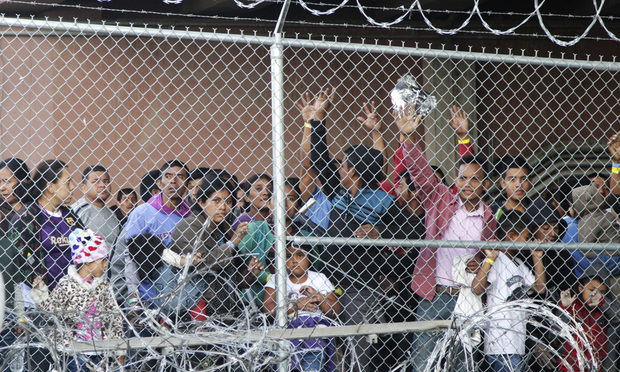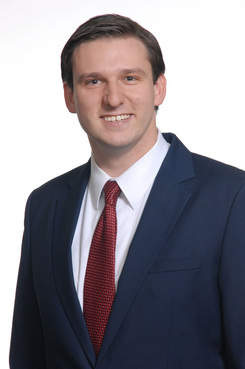Separation Anxiety: Lawyers Were Spurred to Action in the Family Reunification Fight
Lawyers from throughout the Am Law 200 stepped up to help bring families back together in 2018.
June 26, 2019 at 05:30 AM
4 minute read
 Central American migrants wait for food in a pen erected by U.S. Customs and Border Protection to process a surge of migrant families and unaccompanied minors in El Paso, Texas. (AP Photo/Cedar Attanasio)
Central American migrants wait for food in a pen erected by U.S. Customs and Border Protection to process a surge of migrant families and unaccompanied minors in El Paso, Texas. (AP Photo/Cedar Attanasio)
Thomas Turner likes to joke that he hasn't been in a courtroom since the day he was sworn in, but last June he had a good reason to return.
As a transactional lawyer at Miller Canfield in Detroit, Turner was an unlikely option to step into the fray to help an undocumented immigrant gain release from detention and reunite with her son. In times of crisis, though, any help is welcome. Like many lawyers, he was upset to see families being separated at the U.S.-Mexico border, and offered a hand.
Turner took on a referral from the Rocky Mountain Immigrant Advocacy Network and helped his client get a bond set and secured so that she could leave detention in Colorado, locate her 13-year-old son and be reunited with him in Louisiana. As family separations and detentions at the border became headline news last summer, he was part of a flood of lawyers at large law firms rushing in to help.
“So often you read these headlines and you feel helpless, like there are these big systems and they're faceless and nameless and they march in a certain direction. To be able to step in and help someone in this situation was an excellent gift,” Turner says. “This was definitely the most personal case I've ever worked on. I threw myself into it completely.”
He wasn't alone. Numerous firms detailed their work on family reunification in The American Lawyer's Pro Bono Survey.
 Thomas Turner of Miller Canfield.
Thomas Turner of Miller Canfield.Paul, Weiss, Rifkind, Wharton & Garrison secured the release of seven parents from detention centers, and led a team of law firms that helped nearly 200 children reunite with their parents. Arnold & Porter Kaye Scholer helped secure a settlement with the Trump administration to allow 2,700 children to travel to the United States to reunite with their parents after the administration attempted to rescind their approval under the Central American Minors program. Others, including at Mayer Brown, DLA Piper, Squire Patton Boggs and Blank Rome, stepped in to help bring families back together.
“I've heard attorneys say, 'It was keeping me up at night and I just wanted to do something, so I came in the next day and called the pro bono team,'” says Lucy McMillan, a senior attorney for pro bono at Arnold & Porter.
And with so many lawyers throughout the industry eager to help, firms have been working together to put more weight behind their work.
“The collaboration I have seen among law firms, legal services organizations and policy people—it's been really heartwarming how many people want to work together, that there's so much strategy going on to determine how best to use resources,” McMillan says.
At Shearman & Sterling, which addressed the crisis from several angles, collaboration was key. The firm worked with organizations including the Immigration Justice Campaign to interview detained parents from Texas to New York about their circumstances and fought to get families reunited, putting in thousands of hours of pro bono time.
As Saralyn Cohen, Shearman's pro bono director, sees it, immigration law is well situated to draw attention from around Big Law. Because it's a federal, rather than state, issue, with significant training opportunities and resources available for those interested in contributing their time, it's perfectly suited for an outpouring of support from around the country. Cohen's colleague, Emily Griffen, litigation counsel at the firm, was one of many who felt the need to step in.
“In reading about the issue and watching the news on TV, I absolutely knew that I had to use my skills and resources to do something to help separated families,” Griffen says.
Turner, who was sparked in the same way, knows he's unlikely to handle another case quite like the one he took on last summer, even if he does make it back to the courtroom. He was proud to play “a very small role” in making someone's life tangibly better, he says.
“It was one of the best days of my legal career,” he says, “without question.”
This content has been archived. It is available through our partners, LexisNexis® and Bloomberg Law.
To view this content, please continue to their sites.
Not a Lexis Subscriber?
Subscribe Now
Not a Bloomberg Law Subscriber?
Subscribe Now
NOT FOR REPRINT
© 2025 ALM Global, LLC, All Rights Reserved. Request academic re-use from www.copyright.com. All other uses, submit a request to [email protected]. For more information visit Asset & Logo Licensing.
You Might Like
View All
Government Attorneys Face Reassignment, Rescinded Job Offers in First Days of Trump Administration
4 minute read


Energy Lawyers Field Client Questions as Trump Issues Executive Orders on Industry Funding, Oversight
6 minute readTrending Stories
Who Got The Work
J. Brugh Lower of Gibbons has entered an appearance for industrial equipment supplier Devco Corporation in a pending trademark infringement lawsuit. The suit, accusing the defendant of selling knock-off Graco products, was filed Dec. 18 in New Jersey District Court by Rivkin Radler on behalf of Graco Inc. and Graco Minnesota. The case, assigned to U.S. District Judge Zahid N. Quraishi, is 3:24-cv-11294, Graco Inc. et al v. Devco Corporation.
Who Got The Work
Rebecca Maller-Stein and Kent A. Yalowitz of Arnold & Porter Kaye Scholer have entered their appearances for Hanaco Venture Capital and its executives, Lior Prosor and David Frankel, in a pending securities lawsuit. The action, filed on Dec. 24 in New York Southern District Court by Zell, Aron & Co. on behalf of Goldeneye Advisors, accuses the defendants of negligently and fraudulently managing the plaintiff's $1 million investment. The case, assigned to U.S. District Judge Vernon S. Broderick, is 1:24-cv-09918, Goldeneye Advisors, LLC v. Hanaco Venture Capital, Ltd. et al.
Who Got The Work
Attorneys from A&O Shearman has stepped in as defense counsel for Toronto-Dominion Bank and other defendants in a pending securities class action. The suit, filed Dec. 11 in New York Southern District Court by Bleichmar Fonti & Auld, accuses the defendants of concealing the bank's 'pervasive' deficiencies in regards to its compliance with the Bank Secrecy Act and the quality of its anti-money laundering controls. The case, assigned to U.S. District Judge Arun Subramanian, is 1:24-cv-09445, Gonzalez v. The Toronto-Dominion Bank et al.
Who Got The Work
Crown Castle International, a Pennsylvania company providing shared communications infrastructure, has turned to Luke D. Wolf of Gordon Rees Scully Mansukhani to fend off a pending breach-of-contract lawsuit. The court action, filed Nov. 25 in Michigan Eastern District Court by Hooper Hathaway PC on behalf of The Town Residences LLC, accuses Crown Castle of failing to transfer approximately $30,000 in utility payments from T-Mobile in breach of a roof-top lease and assignment agreement. The case, assigned to U.S. District Judge Susan K. Declercq, is 2:24-cv-13131, The Town Residences LLC v. T-Mobile US, Inc. et al.
Who Got The Work
Wilfred P. Coronato and Daniel M. Schwartz of McCarter & English have stepped in as defense counsel to Electrolux Home Products Inc. in a pending product liability lawsuit. The court action, filed Nov. 26 in New York Eastern District Court by Poulos Lopiccolo PC and Nagel Rice LLP on behalf of David Stern, alleges that the defendant's refrigerators’ drawers and shelving repeatedly break and fall apart within months after purchase. The case, assigned to U.S. District Judge Joan M. Azrack, is 2:24-cv-08204, Stern v. Electrolux Home Products, Inc.
Featured Firms
Law Offices of Gary Martin Hays & Associates, P.C.
(470) 294-1674
Law Offices of Mark E. Salomone
(857) 444-6468
Smith & Hassler
(713) 739-1250










